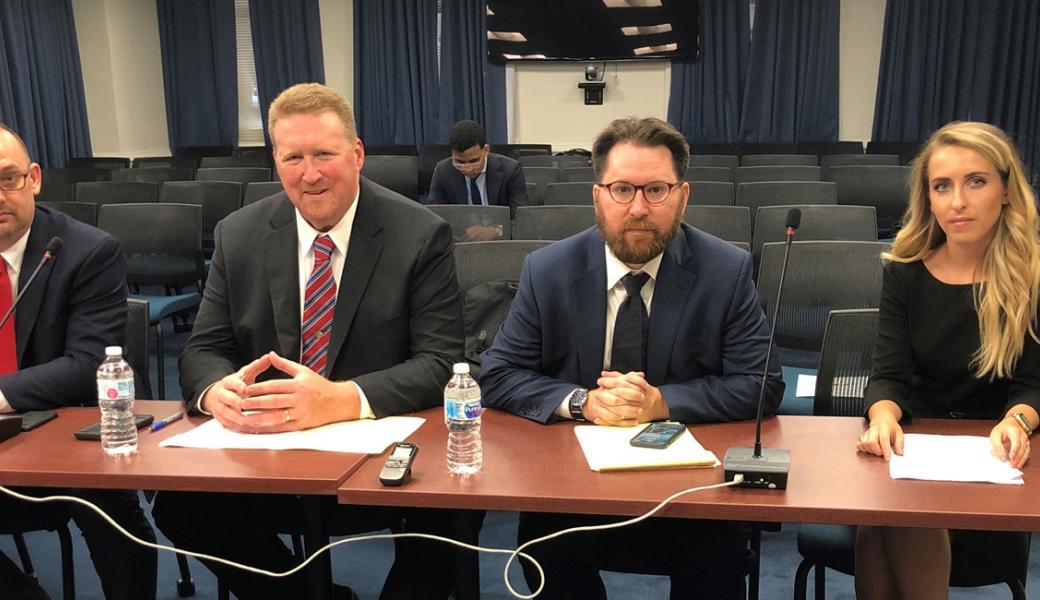Winnebago, Patrick Industries And RV Industry Association Testify In Support Of CNL Waiver

On Tuesday, July 2, Winnebago Industries’ Chad Reece, Patrick Industries’ Scott Warren and RV Industry Association’s Samantha Rocci testified before both the International Trade Commission (ITC) and the Office of the United States Trade Representative (USTR) Subcommittee on the Generalized System of Preferences (GSP). The three RV industry representatives testified in support of the RV Industry Association’s petition for a Competitive Need Limitation (CNL) Waiver for lauan/meranti plywood from Indonesia. If successful, this would remove the duty on imports of relevant plywood less than 3.6 mm thick, saving our industry approximately $1 million a month. They were joined by RV Industry Association’s trade advisor, Daniel Neumann of Sorini, Samet & Associates and the International Wood Products Association.
The Decorative Hardwoods Association (DHA) and an executive of Hanwha Azdel, a producer of a composite panel, testified in opposition to the petition.
The three RV Industry Association witnesses testified before both agencies to prove that no “like or directly competitive” product exists to compete with lauan/meranti plywood. In supporting their argument, they emphasized three factors:
1. THERE IS NO DOMESTIC PRODUCTION OF LAUAN/MERANTI OR TROPICAL HARDWOOD PLYWOOD
Prior to last year’s review, no domestic producer had objected to lauan being included in the program in 30 years. This is because, to all witness knowledge, the industry has never been aware of a domestic producer of lauan or a substitute.
Lauan and meranti do not grow in the continental United States. To produce the plywood here, logs would need to be imported. There have been zero imports of logs of lauan or meranti from Indonesia in the preceding three years. This is likely because all Association of Southeast Asian Nations have imposed prohibitions on harvesting or exporting raw logs and raw timber, as the ITC reported in 2010. Without importing any logs or timber, it is categorically impossible that domestic producers are making this product.
2. NO DOMESTICALLY PRODUCED PLYWOOD IS “LIKE OR DIRECTLY COMPETITIVE” WITH LAUAN
Lauan is unique from domestic hardwood for a variety of reasons: It is light, resists warping, and water resistant - all while being incredibly thin. For the specific uses in RVs, and for the tariff line at issue, plywood can be no thicker than 3.6 mm. U.S. manufacturers generally make plywood that is a quarter inch thick or thicker. That is 6.35 mm - nearly double that of the maximum thickness for lauan imported by the RV sector. That thinness and lightness is critical in RV manufacturing, as weight is always a concern.
Plywood made in America, for example, from birch or oak trees grown here, does not have these same properties and is typically made much thicker. It is of no use in the walls and subfloors of RVs. Lauan is the only product that can meet the strict requirements of the industry.
Finally, there is no indication that efforts have been made by bad actors to use the tariff line to avoid antidumping or countervailing duties on Chinese plywood. Claims to the contrary are unsubstantiated. Nearly 120 other countries enjoy duty-free treatment under GSP and would not be subject to the current 8 percent duty on Indonesian lauan/meranti. There is no evidence that this line is an effective target for such trade circumvention efforts. In fact, it would actually be a very poor line for this purpose because imports must be extremely thin. Any number of other GSP eligible plywood products could be better candidates for circumvention. The thickness of Indonesian lauan plywood is unique and not competitive with U.S. or Chinese imports, it would be incredibly difficult to circumvent AD/CVD duties by merely re-labeling shipments.
3. THERE IS NO “LIKE OR DIRECTLY COMPETITIVE” SUBSTITUTE i.e., COMPOSITES
As the RV Industry Association and its members testified, no composite product can be used in place of lauan for the majority of RV industry applications. Composite products are at least 1.5 to 2 times more expensive and the 8 percent duty on lauan will not have a positive or negative effect on sales of these products. Any price difference simply subsumes the duty cost.
More importantly, such products cannot be used in the interior spaces where lauan is essential for several reasons. Due to the density, such products cannot accept industry-standard fasteners, meaning cabinetry and other interior structural and decorative items cannot be properly fastened. For this reason, even in RVs that use composite products in their exteriors, we estimate that the interior of these RVs still use two to three times as much lauan.
Furthermore, a significant part of the RV industry is comprised of units utilizing a metal or composite exterior, rather than fiberglass exteriors. This method does not require any structural support behind it—either lauan or composite. Instead, there are wood studs to which the metal is attached. On the other side of the stud, the interior lauan wall is attached. There are no applications of this method of construction where component products can be used.
WHAT HAPPENS NOW?
The ITC must now determine whether a “like or directly competitive product” exists and issue a report of its findings, expected in early September. Following the release of the ITC report, USTR will make its determination in early November. If USTR grants the waiver, Indonesian lauan/meranti will once again be eligible for duty-free import under the GSP program. If USTR does not grant the CNL waiver, Indonesian lauan/meranti not be eligible for GSP and the 8 percent duty will remain in place.
For more information, contact Samantha Rocci at srocci@rvia.org.
Please Sign in to View
Log in to view member-only content.
If you believe you are receiving this message in error contact us at memberservices@rvia.org.
